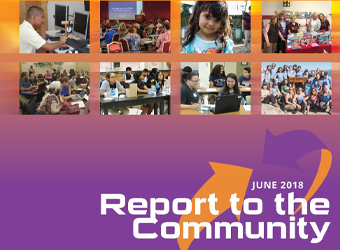The future is now in Collier County.
Future Ready Collier released its inaugural Report to the Community this past summer. The local college access network (LCAN) is comprised of more than 60 organizations, businesses, schools, and community members working to ensure every child in Collier is ready for kindergarten and that every young person enters adulthood with a vision and plan to accomplish that vision.
In addition to telling the story of Future Ready Collier to date, the report features examples of the LCAN’s impact since its official inception in 2016 and highlights some baseline indicators set by the community to measure the progress of their work.
“The purpose was to start to tell the story of what the collective impact collaboration has been here in Collier County,” said Lisa Church, vice president of Champions For Learning, the backbone organization for Future Ready Collier. “It’s been about taking a community approach and finding a different way of working in order to make progress on complex challenges that are tough to solve individually.”
While Future Ready Collier is a partner of the FutureMakers Coalition — a regional LCAN serving Collier, Charlotte, Glades, Hendry, and Lee counties in Southwest Florida — this is the first year the Collier-based LCAN is reporting on the county’s educational progress to the community.
According to U.S. Department of Education data compiled in the report, the FAFSA (Free Application for Federal Student Aid) completion rate for Collier County Public Schools 12th graders rose from 43% to 53% between 2016 and 2017. This 10 percentage point-increase was then matched for 2018, which is remarkable considering many Collier students were impacted by Hurricane Irma at the beginning of the 2017-18 school year.
The report also highlights potential areas for improvement.
According to the report, approximately one-half of children are not developmentally or academically ready for kindergarten in Collier. Additionally, the county’s 37.8% degree attainment rate — the proportion of working age (25-64) residents with an associate’s degree or higher — trails the state’s overall 39.9% rate.
“When we see that one of the key indicators is a lack of experience with education after high school, it presents a really great opportunity,” Church said. “It’s encouraging to know that it’s not so much a lack of interest or lack of commitment. We can help build the experience they need.”
The report includes a section highlighting The Irma Test, a case study that chronicles how Future Ready Collier and its partner organizations united to help ensure the county’s students didn’t fall behind in their college and career planning in the wake of Hurricane Irma.
“Irma showed this (collective impact) approach works,” Church said. “We were able to pivot and mobilize our community in a way that wouldn’t have been possible five years ago.”
According to data from Collier County Public Schools, the county’s Class of 2018 — which had to contend with Hurricane Irma-related damage and school closings last fall — earned $41.3 million in scholarship offers. That figure is almost $6 million higher than the $35.4 million in scholarship offers earned by the previous year’s senior class.
She hopes to get the report in as many hands as possible in Collier, including distributing it to every public school in the county.
“We really blanketed the community,” she said. “The principals and leaders of those schools, they need to be well informed. This is in complete alignment with our district’s strategic plan. With this report, we want to tell a story and hold ourselves accountable.”
The collaborative approach captured by Future Ready Collier’s Report to the Community ensures Collier students will be ready with the right credentials to meet the changings needs of the workforce.
RELATED ARTICLES:
Future Ready Collier unites county to support students in Hurricane Irma aftermath
FCAN announces honorees of its Unsung Heroes of Resilience Awards

